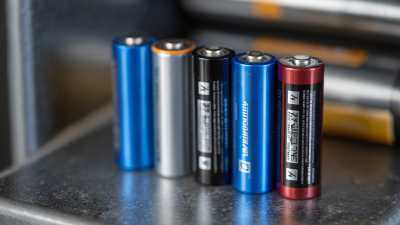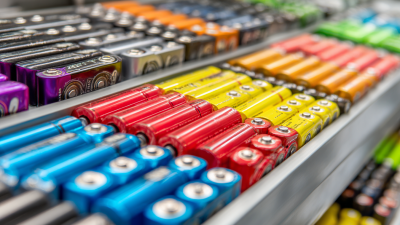Common Issues Faced by Global Buyers When Sourcing Procell AA Batteries
Sourcing Procell AA batteries can be a challenging endeavor for global buyers, especially given the diverse marketplace and varying supplier standards. As more consumers prioritize reliable and high-performance batteries for their electronic devices, understanding the common issues that might arise during the procurement process becomes crucial. From navigating quality control concerns and assessing supplier legitimacy to managing logistics and pricing fluctuations, these challenges can significantly impact the purchasing experience. This blog will delve into the key hurdles faced by global buyers when sourcing Procell AA batteries, providing insights and potential solutions to enhance the buying process. By examining real-world examples, we aim to equip buyers with the knowledge necessary to make informed decisions and successfully navigate the complexities of the battery sourcing landscape.

Challenges in Quality Control of Procell AA Batteries for Global Buyers
When sourcing Procell AA batteries, global buyers encounter significant challenges in quality control that can severely impact their operations. Despite the reputation of Procell batteries for reliability, discrepancies in quality can arise during manufacturing and shipping, leading to variabilities that affect performance. These inconsistencies are particularly troubling for companies that rely on these batteries for critical applications, where battery failure can result in financial losses and reputational damage.
Moreover, navigating the global supply chain complicates these challenges. Just as industries like hazelnuts face uncertainties in production that threaten their viability, battery sourcing is also vulnerable to factors such as geopolitical tensions and fluctuating trade policies. As one country’s decision to impose tariffs can redirect buyers to alternative markets, the landscape for sourcing batteries becomes increasingly complex. Buyers must implement stringent quality control measures and collaborative partnerships with suppliers to mitigate risks associated with sourcing Procell AA batteries effectively.

Navigating Brand Authenticity Issues When Sourcing Procell AA Batteries
When sourcing Procell AA batteries, one of the most pressing challenges global buyers face is ensuring brand authenticity. The market is flooded with counterfeit products that mimic the Procell branding but fail to deliver on quality and performance. Buyers must navigate this complex landscape by employing rigorous verification methods, such as checking packaging for official branding and verifying suppliers through established channels. Additionally, seeking out firsthand reviews or recommendations from trustworthy sources can help mitigate the risk of purchasing fraudulent batteries.
Furthermore, it is crucial for buyers to establish reliable relationships with reputable distributors who are authorized to sell Procell products. These partnerships not only enhance the authenticity of the batteries but also provide access to product warranties and customer support. Buyers should consider engaging directly with manufacturers for bulk purchases or seek certifications that validate the supplier’s trustworthiness. By emphasizing diligence in sourcing practices, global buyers can effectively navigate the pitfalls associated with brand authenticity, ensuring they receive genuine Procell AA batteries that meet their needs.
Common Issues Faced by Global Buyers When Sourcing Procell AA Batteries
| Issue | Description | Possible Solutions |
|---|---|---|
| Brand Authenticity | Challenges in confirming if the batteries are genuine Procell products. | Request certificates of authenticity, check serial numbers. |
| Price Discrepancies | Varying prices across different suppliers may indicate counterfeit products. | Compare prices with multiple trusted suppliers. |
| Quality Assurance | Concern about the quality and performance of the batteries. | Request product samples and quality certifications. |
| Shipping and Logistics | Delays and damages during transportation. | Choose reliable logistics partners and insurance options. |
| Regulatory Compliance | Issues related to regulatory standards in different markets. | Stay updated with local regulations and sourcing standards. |
Supply Chain Disruptions Affecting Procell AA Battery Availability
The supply chain disruptions faced by global buyers when sourcing Procell AA batteries have become a pressing concern in 2023. With consumers still heavily reliant on AA batteries for everyday devices, the demand remains high. Many have taken to purchasing in bulk to mitigate shortages, as exemplified by the trend of acquiring large packs online. However, the ongoing global supply chain issues impact the availability and pricing of these essential batteries, complicating the purchasing process for businesses and consumers alike.
Furthermore, the challenges are exacerbated by the growing interest in eco-friendly energy storage solutions. As the world moves toward a more sustainable future, reliance on traditional batteries must be balanced with the emerging technologies in renewable energy. The recycling of lithium-ion batteries is gaining traction as a way to strengthen supply chains and reduce emissions, indicating a shift in consumer priorities. Nevertheless, for the immediate future, AA batteries remain a staple in households and workplaces, making the logistical hurdles even more significant for buyers seeking consistent and reliable supplies.
Understanding Regulatory Compliance for Procell AA Batteries in Different Markets
When sourcing Procell AA batteries, global buyers must navigate a complex landscape of regulatory compliance that varies greatly across different markets. Each region has its own standards and regulations regarding battery safety, environmental impact, and labeling requirements. It is crucial for buyers to familiarize themselves with these regulations to avoid compliance issues that can lead to hefty fines or product recalls.
Tips for ensuring regulatory compliance include conducting thorough research on the specific regulations applicable in your target market. For instance, in the European Union, the Waste Electrical and Electronic Equipment Directive (WEEE) mandates proper disposal and recycling procedures for batteries. Additionally, the Restriction of Hazardous Substances (RoHS) directive restricts certain hazardous materials in electronic products, including batteries. Staying updated on such regulations can help maintain product integrity and customer trust.
Another vital step is to engage with reliable suppliers who understand the regulatory environment in the markets you are target sourcing. Establish partnerships with manufacturers who can provide certifications and documentation that meet local compliance standards. This proactive approach not only mitigates risk but also enhances supply chain efficiency, ensuring your products meet the expectations of both regulators and consumers.
Cost Variability: Analyzing Price Trends in Procell AA Battery Purchases
 When sourcing Procell AA batteries, global buyers often encounter significant cost variability, which can impact their overall procurement strategy. Recent market analyses indicate that pricing for Procell AA batteries fluctuates due to factors such as raw material costs, production capabilities, and supply chain disruptions. For instance, a report by the International Battery Association highlights that lithium and cobalt prices have surged by over 30% in the last year, directly affecting battery manufacturing costs. This considerable price variability necessitates careful monitoring and forecasting to ensure budget adherence.
When sourcing Procell AA batteries, global buyers often encounter significant cost variability, which can impact their overall procurement strategy. Recent market analyses indicate that pricing for Procell AA batteries fluctuates due to factors such as raw material costs, production capabilities, and supply chain disruptions. For instance, a report by the International Battery Association highlights that lithium and cobalt prices have surged by over 30% in the last year, directly affecting battery manufacturing costs. This considerable price variability necessitates careful monitoring and forecasting to ensure budget adherence.
Furthermore, regional disparities in pricing can create challenges for buyers. According to data from Market Research Future, North America has reported an average price range of $1.50 to $2.00 per Procell AA battery, while prices in Asia can be significantly lower, ranging from $1.00 to $1.50. This discrepancy often arises from differing production scales and logistics costs, compelling buyers to evaluate their sourcing options critically. Engaging multiple suppliers and leveraging bulk purchasing agreements can be effective strategies for mitigating these cost fluctuations, ultimately leading to more sustainable procurement practices.
Related Posts
-

5 Reasons Why CIC Rechargeable Hearing Aids Are the Top Choice for Clear Hearing
-

Exploring Innovative Alternatives to D Cell Batteries for Sustainable Power Solutions
-

Your Ultimate Guide to Finding the Best AA Battery Replacement for Every Need
-

Exploring Alternative Energy Solutions: The Rise of Procell AA Batteries in Global Markets
-

Top Strategies for Maximizing Performance with Procell AA Batteries
-

Navigating Issues with Bulk AA Battery Supply Chains in Global Markets
